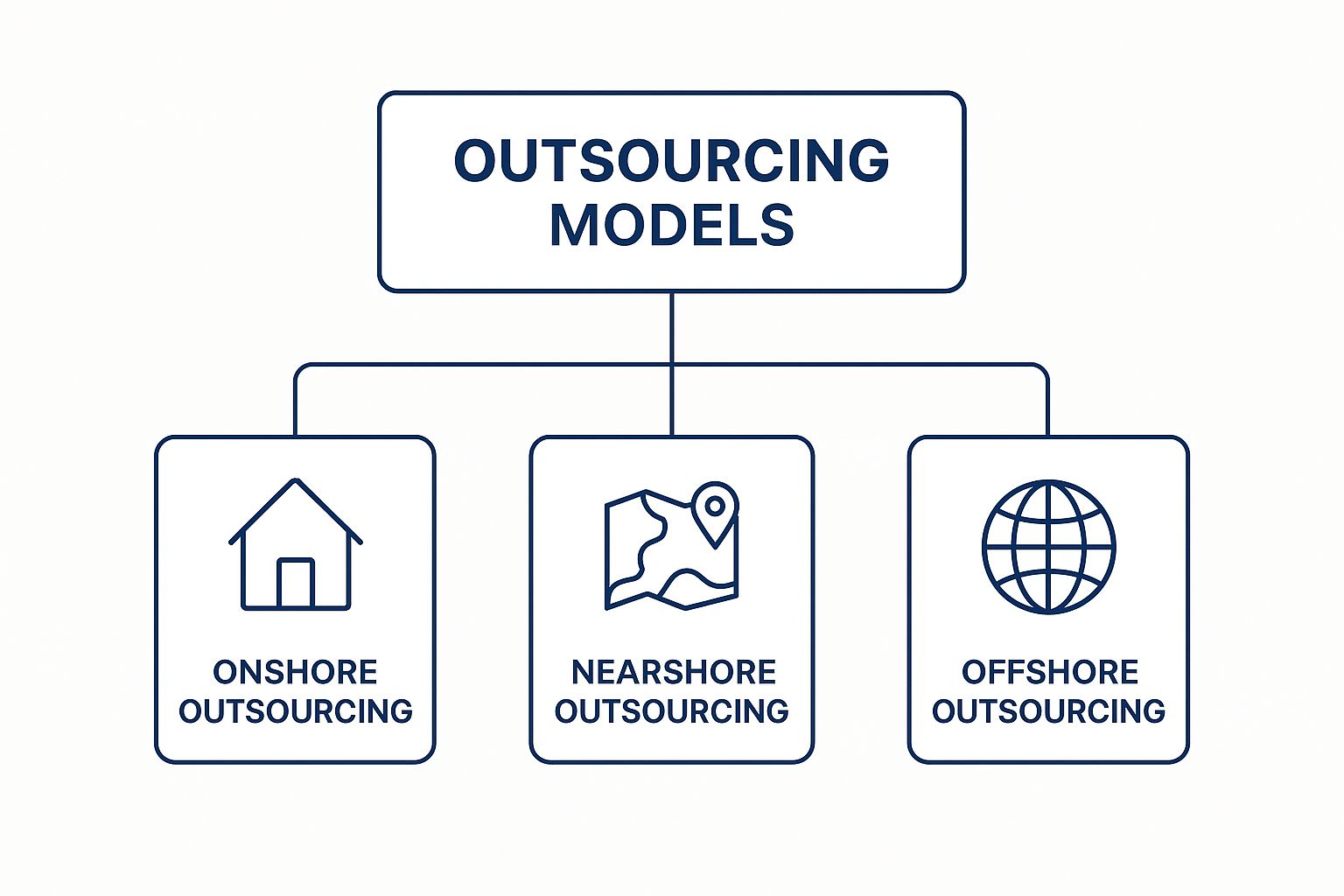Think of an outsourcing company as a specialist partner you bring on board to handle specific business tasks you'd normally manage yourself. This frees up your team to concentrate on what they do best, whether that's developing new products, closing sales, or nurturing client relationships, while the partner takes care of things like IT support, accounting, or customer service.
Breaking Down What an Outsourcing Company Does

Let's use an analogy. Imagine your business is a brilliant chef. You’re a master at creating incredible dishes, but you’re getting bogged down washing up, ordering ingredients, and trying to promote your restaurant. It's taking you away from the kitchen.
An outsourcing company is the specialist you hire to handle those other crucial jobs. They are your expert dishwashing crew, your super-efficient inventory manager, or your creative marketing team, letting you get back to the stove.
This kind of partnership lets you focus purely on your core competency—cooking, in this case. By handing over certain functions, you immediately gain access to specialised skills, new technology, and greater efficiency, all without the cost and hassle of hiring and training a new internal team. It's a smart move to operate more effectively and fuel growth.
It's a model that’s clearly working for many. The UK's Business Process Outsourcing (BPO) market is expected to reach around USD 31.46 billion, which shows just how many businesses are relying on these partnerships.
Core Functions and Goals
To really get to grips with this, it helps to look at what these companies actually do and why businesses choose to work with them.
Here's a quick summary of the core functions and the goals behind them.
Outsourcing at a Glance
As you can see, the reasons vary but the objective is often the same: smarter, more focused operations. A classic example is bringing in digital marketing agencies to run online campaigns, leaving the in-house team to focus on product development.
At its heart, outsourcing is about delegation and specialisation. You delegate non-core tasks to a partner who specialises in them, creating a win-win scenario where both businesses can excel at what they do best.
And this strategic move isn't just for massive corporations. It's an incredibly powerful tool for businesses of all sizes looking to scale intelligently and stay competitive.
Exploring Different Outsourcing Models
Deciding to bring an outsourcing company on board isn't a one-size-fits-all decision. It’s a bit like choosing a new office space; the location you pick has a huge impact on everything from your budget to how your teams work together day-to-day.
Getting your head around the different models is the first step to finding a partner that actually fits what you’re trying to achieve. The main options are all about geography—where your new partner is based in relation to you.
This diagram lays out the three core models, all defined by their distance from your home base.

As you can see, the options range from onshoring (staying local) to offshoring (going global), with nearshoring sitting somewhere in between. Let’s break down what that really means.
Onshore Outsourcing
Onshoring is pretty straightforward: you’re partnering with a company located in your own country. For a business in the UK, that could mean a London-based firm hiring a team over in Manchester.
The obvious upside here is simplicity. There are no cultural gaps, no language barriers, and everyone's in the same time zone, which makes meetings and collaboration a breeze. The trade-off, however, is cost. You’re paying local market rates, so this is almost always the most expensive option.
Nearshore and Offshore Models
Nearshoring involves working with a team in a neighbouring country, typically one with a similar time zone. A UK company, for instance, might look to partners in places like Poland or Romania. This strikes a neat balance, often delivering big cost savings while keeping time differences to a manageable hour or two.
Then you have offshoring. This is when you hire a company much further afield—think South Africa or the Philippines. This model is where you'll find the most dramatic cost reductions, with potential savings of up to 70% on labour.
While offshoring offers the biggest financial prize, it also demands the most careful management. You have to actively navigate significant time zone differences and cultural nuances to make the partnership a success.
Get that right, though, and you can unlock huge benefits without sacrificing quality or clear communication.
The Real Business Benefits of Outsourcing

So, why do so many successful companies bring an outsourcing partner on board? It’s rarely just about saving a few quid. The decision is a strategic one, aimed at building a more resilient, efficient, and focused business.
One of the first things you'll notice is the impact on your bottom line. Think about everything it costs to hire a new employee in-house: salary, benefits, office space, new equipment, and all the time spent on training. Outsourcing lets you sidestep many of these fixed overheads, turning them into a predictable, variable expense instead.
This financial agility is a huge driver behind the booming UK outsourcing market. It generated roughly USD 219.55 billion in revenue and is projected to climb towards USD 387.32 billion.
Unlocking Specialised Talent and Sharpening Focus
Beyond the numbers, outsourcing is your fast track to a global pool of specialised talent. Instead of spending months trying to find that one person with a very specific, niche skill set, you can simply partner with a firm that has a whole team of vetted experts ready to jump in.
This access to expertise is a game-changer. It frees up your core team to zero in on the activities that actually move the needle for your business.
Imagine a tech startup that decides to outsource its accounting and bookkeeping. Suddenly, the founders and developers aren't bogged down by financial admin. All that energy is redirected into what they do best: improving their product, innovating, and winning new customers.
This shift in focus is often where the real magic happens. Your team goes from being generalists, trying to juggle everything, to specialists concentrating on high-impact work. Of course, it's always smart to weigh the advantages and disadvantages of outsourcing before you commit.
Gaining a True Competitive Edge
When you add it all up, these benefits create a powerful competitive advantage. By optimising costs, tapping into world-class skills, and sharpening your company’s focus, you can achieve results that would be incredibly difficult—or even impossible—to manage on your own.
Your business becomes more agile, scalable, and ultimately, better prepared for long-term growth.
What Kind of Services Can You Actually Outsource?
Knowing what an outsourcing company is in theory is one thing, but seeing what businesses actually hand over makes it all click. You can group these services into a few main buckets, each solving different business puzzles—from the daily grind of admin to highly technical, specialised projects.
The golden rule is this: if a task is essential for your business to run but isn't the thing you actually sell, chances are there’s an expert company out there ready to take it on. It’s like getting an entire specialist department on tap, without having to build it from the ground up.
Let's break down the most common services businesses choose to outsource.
Comparing Common Outsourcing Services
To give you a clearer picture, here’s a quick comparison of the most popular outsourcing categories and the kinds of tasks they typically cover.
Each of these categories offers a different kind of support, allowing you to plug expertise into specific areas of your business exactly where you need it most.
Business Process Outsourcing (BPO)
Think of BPO as outsourcing the engine room of your business. This is probably the most common type of outsourcing, and it’s all about handing over the operational and administrative functions that keep everything ticking over.
What does that look like in practice?
- Customer Support: Managing the flood of customer calls, emails, and live chats to make sure everyone gets a professional and timely response.
- Human Resources: Taking care of payroll, managing employee benefits, or handling the recruitment process. Many businesses also bring in experts for specific HR challenges, like implementing effective absence management strategies.
- Accounting and Finance: Keeping the books in order, chasing invoices, paying suppliers, and preparing financial reports.
In the UK, customer relationship management is the biggest slice of the BPO pie, though demand for software consulting is growing fast.
When you outsource these processes, you’re not just offloading tasks. You’re freeing up your internal team to focus on what really drives the business forward, instead of getting stuck in the weeds of daily admin.
Information Technology Outsourcing (ITO)
Technology is more complex and critical than ever, which is why so many businesses now rely on ITO providers. This is your go-to for anything and everything related to your company’s tech, from the software you use to the network that keeps you online.
Common services include things like software development, managing your cybersecurity defences, or running the IT help desk. It’s a huge area, and we’ve put together a full guide on how to outsource IT services if you want to explore it further.
Knowledge Process Outsourcing (KPO)
KPO takes things a step further than BPO. This isn’t about routine processes; it’s about outsourcing high-level, brain-powered work that requires deep expertise and analytical skill.
We’re talking about tasks like in-depth market research, complex data analytics, or even legal process support. KPO providers act as an extension of your brain trust, delivering the expert insights you need to make smarter, more informed business decisions.
How to Find Your Ideal Outsourcing Partner
Choosing an outsourcing company is a lot like hiring a key employee. Getting the right fit is absolutely crucial for long-term success. It’s never just about finding the cheapest option; it's about building a reliable partnership that delivers real value and helps your business thrive.
This whole process really starts with a bit of introspection. Before you even begin looking at providers, you need to be crystal clear on what you want to achieve. Are you aiming to slash operational costs? Do you need specialised skills for a new project? Or is the goal to free up your internal team to focus on core growth activities?

Once you have clear goals, you can put together a detailed brief. This should outline the scope of work, the skills required, and the key performance indicators (KPIs) you’ll use to measure success. Think of this document as your north star during the selection process.
Vetting Potential Partners
After you've shortlisted a few potential companies, the real work begins. Don’t just take their marketing materials at face value. You need to dig deeper to verify their expertise and reliability. A critical step here is applying a robust set of vendor selection criteria to properly evaluate each potential partner.
Start with their track record. Ask for case studies and client testimonials that are directly relevant to your industry and the specific services you need. A good partner will be more than happy to show you how they’ve solved similar problems for other businesses.
It's also essential to assess their technical capabilities and security protocols. This is non-negotiable, particularly if they'll be handling sensitive company or customer data.
A prospective partner’s willingness to discuss their security measures in detail is a strong indicator of their professionalism. If they're vague or dismissive, consider it a major red flag.
Key Questions and Cultural Fit
During your discussions, focus on asking pointed questions that go beyond their sales pitch. Understanding their processes is key to a smooth collaboration.
Here are a few essential questions to get you started:
- What is your onboarding process like? A structured onboarding process ensures a smooth transition and minimises disruption.
- How do you handle communication? Look for regular check-ins, clear reporting structures, and a dedicated point of contact.
- Can you describe your team’s expertise? You want to know about the skills and experience of the people who will actually be working on your account.
- What’s your approach to problem-solving? A proactive partner will spot and address issues before they escalate.
Finally, never underestimate the importance of cultural fit. Your outsourcing partner is an extension of your team, and a mismatch in values or work styles can lead to a lot of friction down the line. To learn more about this, check out the benefits of outsourcing recruitment for finding a team that aligns perfectly with your company culture.
Got Questions About Outsourcing? Let's Clear Things Up.
Even after you've got your head around what an outsourcing company does, it's completely normal to have a few lingering questions. It's a big business decision, after all. Stepping into the world of outsourcing can feel a bit daunting at first, but a few straight answers can usually sort out the most common worries.
Let's tackle the big questions business leaders usually have. We’ll cover everything from whether it’s a viable option for smaller companies to the potential pitfalls and how the whole thing is priced.
Is Outsourcing Just for Big Corporations?
Absolutely not. It’s a common misconception that outsourcing is a game only played by massive multinationals. These days, it's become an incredibly powerful, and often essential, tool for small and medium-sized businesses (SMBs). In fact, you could say it levels the playing field.
For an SMB, working with an outsourcing partner gives you access to top-tier talent and advanced technology without the eye-watering cost of building it all from scratch. It lets a smaller business punch well above its weight, operating with the kind of efficiency you'd expect from a much larger organisation. This frees up founders and their core teams to focus on what really matters: growth and innovation.
What Are the Biggest Risks I Should Be Aware Of?
Every business move has its risks, and it pays to go in with your eyes open. When it comes to outsourcing, the main concerns usually fall into three camps:
- Communication Gaps: It's easy for misunderstandings to crop up, especially if there are cultural differences or you haven't established clear, regular channels for catching up.
- Data Security: Handing over sensitive business information is a big deal. It requires absolute trust in your partner and their security setup.
- Loss of Direct Oversight: You’re placing a part of your business in someone else's hands, which can naturally feel like you're giving up a degree of control.
The good news? These risks are entirely manageable. A trustworthy partner will already have stringent security protocols in place, and a detailed Service-Level Agreement (SLA) will lock in clear expectations for performance and communication right from the start.
Honestly, choosing the right partner and setting clear ground rules from day one is the best way to head off these potential problems before they even begin.
How Is the Cost of Outsourcing Calculated?
There's no one-size-fits-all answer here. The final cost really depends on a few key things: the exact service you need, the skill level required, and where your provider is based. A UK-based onshore partner will naturally cost more than an offshore one in a different country.
You'll typically see a few common pricing models: a fixed monthly retainer for ongoing work, a set price for a specific project, or straightforward hourly rates. The most important thing is to get a detailed quote that breaks down exactly what's included, so you don't get hit with any surprise costs down the line.

